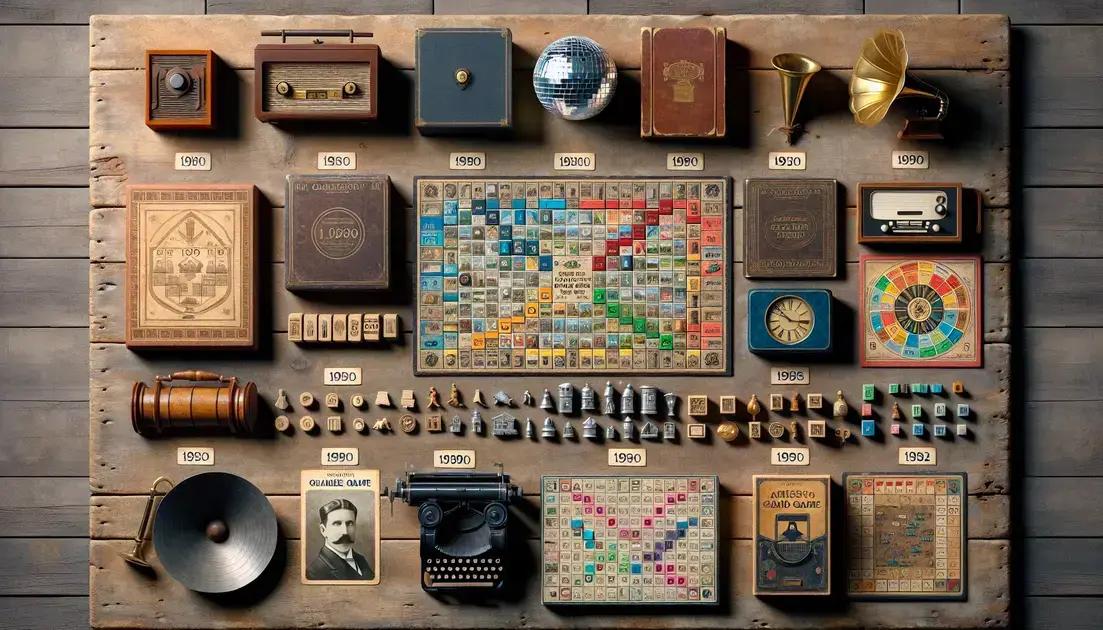Monopoly board game history traces back to Elizabeth Magie’s Landlord’s Game in 1904, evolving through Charles Darrow’s 1930s adaptation and Parker Brothers’ commercialization into a cultural icon with many modern variants.
Have you ever wondered about the monopoly board game history beyond the surface? This classic game has a story full of surprises, myths, and truths that you might never have heard. Let’s take a journey to uncover what really happened behind the scenes.
early inspirations and precursors to monopoly
The origins of the Monopoly board game trace back to the early 20th century, inspired by several social and economic ideas. One of the key precursors was the ‘Landlord’s Game,’ created by Elizabeth Magie in 1904 to demonstrate the negative aspects of land monopolies and economic inequality. This game aimed to educate players on how wealth concentration affects society.
Elizabeth Magie and the Landlord’s Game
Elizabeth Magie’s design was innovative, featuring properties, rent payments, and taxes, which laid the groundwork for the modern Monopoly. Her game had two sets of rules: one promoting monopolism as a winning strategy and another encouraging wealth redistribution, highlighting social commentary embedded in the gameplay.
Influence of Progressive Era Ideas
The game reflected the Progressive Era’s concerns about capitalism, land ownership, and economic fairness. It was an example of using games as educational tools, blending entertainment with political messages, something quite unique for that time.
Variants and Folk Development
As the Landlord’s Game spread, players created homemade versions, adapting rules and boards. These variations, often shared locally, helped evolve the concept and contributed to the eventual creation of Monopoly as we know it today.
Understanding these early inspirations and precursors provides insight into how Monopoly started as a critique of economic systems before becoming a beloved classic game.
the creation of the original monopoly game
The creation of the original Monopoly game is often credited to Charles Darrow in the early 1930s. Darrow, an unemployed salesman during the Great Depression, adapted and refined earlier versions of the game, adding distinctive elements like the Atlantic City street names and unique game tokens. He presented his version to Parker Brothers in 1935, where it was accepted and became widely popular.
Charles Darrow’s Role
Darrow claimed to have invented the game himself, but historical research shows he built upon earlier designs. Despite this, his influence was significant for designing the iconic layout and standardizing the rules that defined Monopoly for decades.
Key Features Introduced
Some of Darrow’s additions include detailed property deeds, house and hotel pieces, and the “Chance” and “Community Chest” cards. These features created a richer gaming experience, balancing luck and strategy with player interaction.
Parker Brothers and Commercial Success
Once Parker Brothers licensed the game, they improved the production quality and marketing reach. This led to Monopoly becoming one of the best-selling board games worldwide, especially during a time when affordable home entertainment was in demand.
Understanding the creation of the original Monopoly highlights how innovation combined with strategic marketing transformed a simple concept into a cultural phenomenon.
controversies around charles darrow’s role
Charles Darrow is widely known as the inventor of Monopoly, but his role has sparked many controversies. While Darrow claimed to have created the game during the Great Depression, evidence shows he adapted it from earlier versions created by others, notably Elizabeth Magie’s Landlord’s Game.
Claims and Claims Disputes
Darrow’s claim of invention was challenged because the Landlord’s Game existed decades before his version. Historians discovered that many elements of Monopoly were already present in earlier homemade versions circulated among communities.
Elizabeth Magie’s Contribution Overlooked
Elizabeth Magie designed the Landlord’s Game in 1904 to highlight economic injustices. Her creation was largely ignored at the time, and Darrow’s version overshadowed her original purpose and innovation.
Parker Brothers’ Role in Shaping the Narrative
The Parker Brothers, who bought the rights from Darrow, promoted him as the sole inventor to protect their commercial interests. This marketing shaped public perception, often disregarding the collaborative evolution of the game.
The controversies around Charles Darrow’s role remind us how history can be shaped by storytelling and marketing, not always reflecting the full truth behind innovations.
how monopoly evolved through the 20th century

Throughout the 20th century, Monopoly went through many changes that helped it stay popular and relevant. After Parker Brothers acquired the rights in 1935, they standardized the design and rules, making the game easier to play and mass-produce.
Expansion and New Editions
As the decades passed, Monopoly released numerous editions reflecting different cities, themes, and special interests. These editions broadened its appeal globally and kept players engaged with fresh content.
Changes in Design and Components
The game’s components evolved too. Early wooden houses and hotels were replaced by colorful plastic pieces. The tokens used by players changed over the years, introducing new metal pieces that became iconic.
Monopoly in Popular Culture
Monopoly also became a symbol in movies, TV shows, and advertising. Its imagery evoked wealth, competition, and sometimes greed, shining a light on its cultural impact beyond the board game itself.
Overall, these developments throughout the 20th century transformed Monopoly from a simple board game into a cultural phenomenon with deep roots in modern entertainment.
the impact of monopoly on popular culture
Monopoly has had a deep and lasting impact on popular culture since its rise to fame. The game’s themes of property ownership, wealth, and strategy have influenced films, TV shows, music, and even art, often symbolizing capitalism and economic competition.
Monopoly in Film and Television
Monopoly frequently appears in movies and TV series, either as a mere prop or as a central theme. It represents everything from friendly competition among characters to deeper allegories about greed and ambition.
Monopoly Symbols and References
The iconic Monopoly man, the colorful property spaces, and the game’s money have become instantly recognizable symbols. They are used in advertising, political cartoons, and social commentary to represent wealth and power.
Influence on Music and Art
Artists and musicians have drawn inspiration from Monopoly’s themes. Album covers, songs, and visual arts sometimes reference the game to critique or celebrate consumer culture and economic struggles.
This widespread cultural presence shows how Monopoly has transcended being just a board game, becoming a powerful icon in society’s conversation about money and success.
strategies behind monopoly’s enduring success
Monopoly’s enduring success is no accident; it is the result of several well-executed strategies. At its core, the game offers a blend of luck, strategy, and social interaction, which keeps players engaged and coming back for more.
Balancing Chance and Skill
Monopoly combines elements of randomness, like dice rolls and card draws, with strategic decisions about property buying and trading. This balance makes every game unique and appeals to a broad audience.
Strong Branding and Marketing
The game has benefited from aggressive marketing and recognizable branding, including iconic tokens, colorful boards, and the familiar Monopoly mascot. These have helped build a strong identity and lasting recognition.
Adapting to Trends and Audiences
Over the years, Monopoly has adapted to changing tastes by releasing themed editions and digital versions. These adaptations maintain relevance and attract new generations of players while keeping longtime fans interested.
Additionally, community and competition aspects foster social interaction, making Monopoly not just a game but a shared experience that builds memories and connections.
modern adaptations and variants of monopoly
Monopoly has seen numerous modern adaptations and variants that keep the game fresh and appealing to diverse audiences. These versions often reflect popular culture, technology, and changing player preferences.
Themed Editions
The game has been adapted into countless themed editions based on cities, movies, TV shows, and even video games. These editions feature customized boards, tokens, and cards that resonate with fans and collectors alike.
Electronic and Digital Versions
With advances in technology, Monopoly has expanded into digital formats, including video games and mobile apps. These versions introduce new gameplay mechanics, online multiplayer options, and interactive features to enhance user experience.
Speed and Simplified Versions
To suit modern lifestyles, faster and simplified versions of Monopoly have been created. These versions reduce game length while maintaining core elements, making them ideal for casual or younger players.
Overall, these modern adaptations show Monopoly’s ability to innovate and remain relevant, ensuring it continues to capture the interest of new generations of players.
Wrapping up the fascinating history of Monopoly
The story of Monopoly is rich with innovation, controversy, and cultural impact. From its early inspirations to Charles Darrow’s pivotal role, the game has evolved through smart strategies and modern adaptations.
Monopoly remains more than a board game; it’s a reflection of society’s views on wealth, competition, and fun. Understanding its history helps us appreciate why it continues to capture hearts around the world.
Whether you play the classic version or one of its many variants, Monopoly’s legacy shows how a simple game can become a lasting cultural icon.




